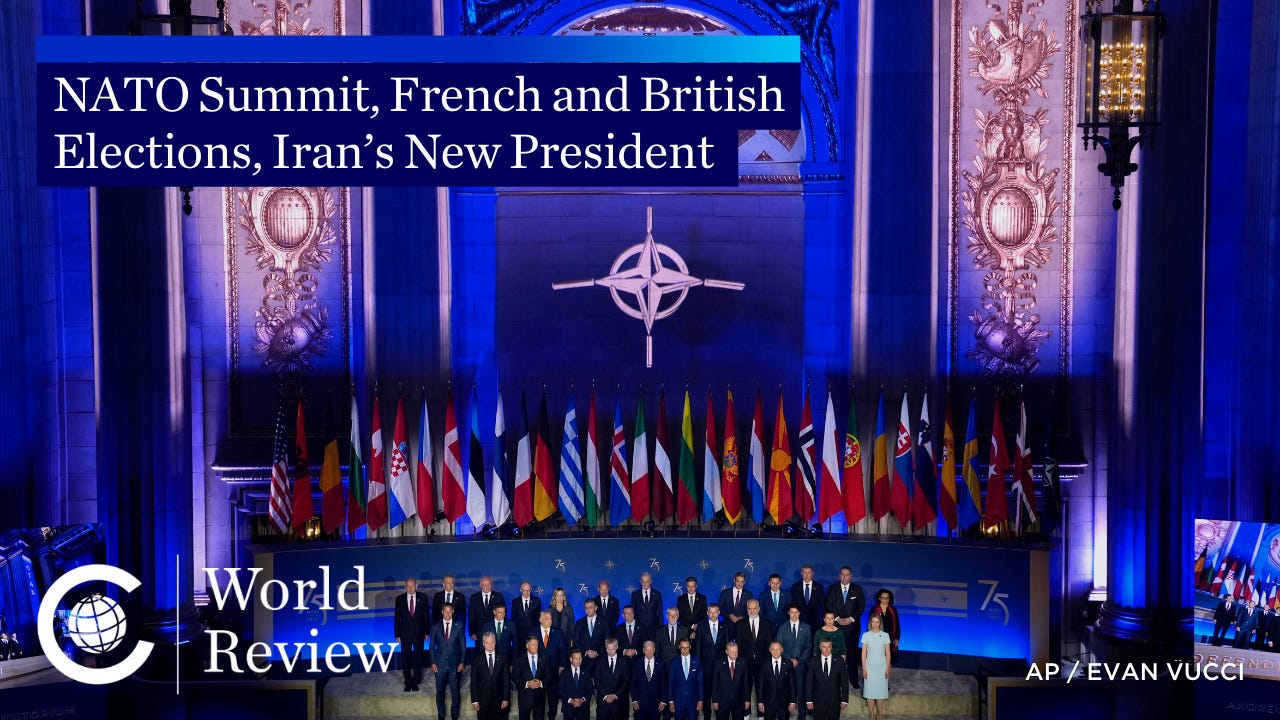World Review: NATO Summit, French and British Elections, Iran's New President
A brief synopsis of this week's show
Each Friday morning, I host a video podcast called “World Review with Ivo Daalder” where three journalists from major news outlets around the world join me in discussing the latest global news stories of the week.
This morning, July 12, I was joined by Kim Ghattas of The Atlantic, Carla Robbins of the Council on Foreign Relations, and Philip Stephens of the Financial Times.
“World Review is always fascinating. I love the fact that you can get journalists from around the world to participate since zoom is the medium.”
— A Subscriber to America Abroad
While I encourage you to watch or listen to the episode (and subscribe wherever you get your podcasts!), here are a few interesting things I took away from our discussion:
Elections in Britain and France had both good and bad news. In Britain, Labor returned to government after a 14 year absence with a 172-seat majority—an extraordinary turnaround from the major losses it had suffered just five years earlier. The new prime minister, Keir Starmer, is a moderate within the center-left party and promises what Philip called a return to “sober and sane” governance. He is pro-European and will try to use the stabilizing perch of his strong majority to play a constructive, convening role in global affairs. The world can use a sober and predictable power like Britain at this time of great turmoil and uncertainty. In contrast, France will likely contribute to that very turmoil and uncertainty because of President Macron’s bold, but foolhardy decision to call a snap election in the wake of the massive victory for the far-right in the EU elections last month. The good news is that Marine Le Pen’s National Rally didn’t win; it came in third. The bad news is that no one else did either, leaving France without a governing majority. The impact on Macron, who controls foreign and defense policy, but not domestic policy and the budget, is uncertainty. It’s in his nature to take bold actions, no matter what. But whether he will be any more effective than he has been in the past is very much to be seen.
Last week saw another surprise election—this one in Iran, where relative moderate Massoud Pezeshkain won a major victory over the hardline forces. The results may not matter much for Iranian foreign policy. Kim suggested it would be more like putting a “smiling face on a continuing hard line” than a change in direction. There is no interest in restarting nuclear talks with the United States, though Iran does want to avoid a regional war and escalation. Sober Britain might play a convening role, but London too believes that the nuclear program has advanced too far to put that genie back in the bottle. Washington, in any case, isn’t interested in returning to the bargaining table—at least not in an election year. All of this feeds conspiracy theories, Kim remarked, that the sudden death of former President Raisi and his hardline foreign minister in a helicopter crash might not have been an accident, allowing the Supreme Leaders and his allies to engineer the election of a more moderate face to address domestic political discontent without changing hardline policy in the slightest. Or, if not actually the cause of the accident, then the leadership surely exploited it to engineer this outcome.
In Washington, meanwhile, the big story this week was the NATO Summit and how its U.S. host would perform on the world’s largest public space. Ukraine got verbal and material support it sought, but not the membership invitation it wants and needs. European NATO members stepped up spending. And NATO allies put China in the crosshairs. But these achievements were largely ignored as all of the attention was firmly on President Biden and the consequences of Donald Trump returning to the presidency next year, Carla noted. While Biden and his 31 fellow NATO leaders celebrated the alliance’s 75 year anniversary, Trump was blasting NATO on the campaign trail—underscoring that, unique among presidents over the past 75 years, he holds little water for history’s most successful and longest-lasting military alliance. Philip recounted a fear he had heard in Whitehall, of Trump summoning NATO leaders to Brussels early next February and telling them he was on his way to Moscow to meet with Putin and offer him a deal to end the war. What would Europe do in this nightmare scenario? It was one few in Washington this week were willing to contemplate.
That’s it for my quick takes of this week’s episode here on America Abroad. To get the full flavor, please listen to the episode itself.



